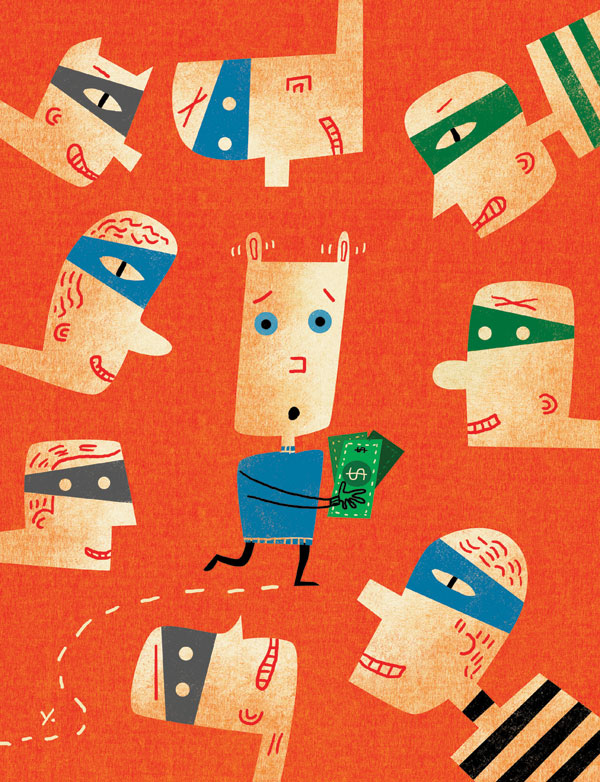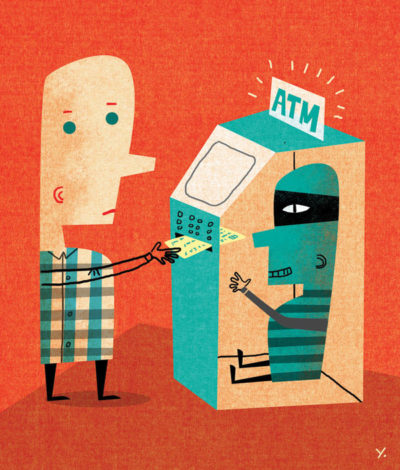Sneakiest New Scams

Those self-described “African kings” who offer to make you a millionaire by helping move an overseas fortune into the safety of your bank account are old hat. Really old. For at least 40 years, they’ve been sending the so-called “Nigerian Letter”—first by U.S. mail, then as the first mass email scam of the Internet Age that remained the top scam throughout the first decade of the new millennium. Sure, postage-free email, the easy availability of cyber address lists, and hard-to-track anonymity provided by free Hotmail, Yahoo, and Gmail accounts all help explain why it remains a common con today.
But, as consumers finally learned to be wary of out-of-the-blue offers of untold riches, clever Nigerian letter scammers found ways to adapt. These days, instead of just masquerading as monarchs, some also pose as wealthy foreign businessmen on dating websites, asking cyber sweethearts for money for a plane ticket to meet them or help them out of a jam. Others claim to be bank lenders who “approved” two percent loans in a tough economy—after the requested application fee is paid. Still others have been known to pose as FBI director Robert Mueller or even Hillary Clinton, threatening arrest or offering political help to get a hidden inheritance (depending on the letter) unless upfront fees are paid to keep you out of jail or put you on Easy Street.
The very latest spin on all of the above scams has been to abandon email (too common, too much competing spam) in favor of the old-fashioned fax. As with email, faxes also can be sent en masse, with “predictive dialers” that call thousands of random phone numbers per day; if a fax tone is reached, the transmission goes through.
Sigh! Just goes to show you, some old scams never die. Instead (and often after well-publicized warnings), they just get tweaked. So be aware—and beware—of these creatively sinister newly rewritten rip-offs, hustles, and cons:
Telephone Scams
Misleading telephone offers date back almost to Edison. Here are the most common and their newest incarnations:
1. Fake Lotteries. The classic approach is to say “you have already won” a lottery that, in fact, you never entered. (One tip-off: they’ll ask you to pay advance fees—never part of legitimate winnings—in order to claim your prize.) Or, they call to ask for donations for phony charities (often in the wake of recent disaster) or to promise government grants, low-cost medication, or a “free” vacation (any of which they claim requires your personal information and credit card).
The New Twist. Now fraudsters who work the phone try to get you to call them. For example, you receive a mailed letter for any of the reasons above, or stating there’s a UPS package that cannot be delivered, or that you’re entitled to cash from a special (secret) government program. You’ll call what seems like an American area code, but is actually the number for a Caribbean country. Dialing that number may cost as much as $5 or more per minute. So, the scam is actually two-pronged: As an operator tries to weasel your personal or financial information for identity theft, you’re simultaneously running up sky-high phone bills—thanks to a series of transfers, long holds, and lengthy small talk to keep you on the line as long as possible.
2. Distress Calls. Another classic phone scam is the call to targeted grandparents. Scammers pretend to be a grandchild in need of money after being arrested or hospitalized while vacationing abroad. They often try a generic greeting such as “Hi, Grandma, it’s me, your favorite grandson!” with hopes you will reply, “Billy? Is that you?”
The New Twist. Now, scammers are increasingly identifying themselves with the specific names of grandchildren—as in “Hi, Grandma, it’s Billy, and I need your help!” They get grandkids’ names from Internet searches on ancestry websites, Facebook accounts, online telephone directories, or reading recent obituaries of the target’s spouse.
3. Timeshare Resale Agents. Timeshares have a tendency to lose value. For years, distraught timeshare owners have been barraged with offers to help unload their unwanted units by self-described “resellers.” These sleazy profiteers promise they already have an interested buyer. All they need is their fee—upfront, please—to make the transaction occur. (Of course, the buyer is nothing more than a figment of the scammer’s imagination.)
The New Twist. Timeshare owners who’ve been swindled of upfront fees by phony resellers are now being re-contacted by so-called “fraud recovery” specialists. Guess what they’re being offered? Help with recouping that lost money—for another upfront fee, of course. Sometimes, it’s the same “resellers” now calling as “recovery” specialists, according to FBI reports. At best, pay a “recoverer” and you’ll get little more than forms or instructions to file complaints with investigating government watchdogs—all of which you can get for free at websites for the Federal Trade Commission or your state Attorney General. At worst, you get nothing but a smaller checking account.
Protect Yourself from Phone Scams. Hang up on any unsolicited phone call seeking personal or financial information. To avoid the phone bill trap, be cautious about calling back anyone with an area code you don’t immediately recognize. The most commonly used Caribbean area codes are 876, 809, or 284 (Jamaica, the Dominican Republic, and the British Virgin Islands). Also be wary of Canadian area codes, which are also three digits long.

Debit Card Scams
The invention of the ATM has not just made banking a greater convenience: It’s been a source of unlimited inspiration to the criminal mind. Top scams include:
1. ATM Skimming. Portable “skimming” devices—sold online for as little as $100—are placed over or behind the card slot to record information encoded in the magnetic strip of debit cards. With miniature spy cameras placed nearby to record PIN numbers used to make cash withdrawals, crooks are able to make duplicate cards and score fast cash from multiple machines. Without a PIN, they can make fraudulent online purchases.
The New Twist. Automated card machines at gas pumps have become an even more desirable target. Reason: With only a couple of manufacturers of gas pumps, a single key—in the hands of a scammer who gains employment at one gas station—can open pumps at multiple stations to install the sinister skimmers.
2. Fake “Out of Order” Signs. In bank vestibules with several ATMs, crooks place “Out of Service” signs on non-tampered ATMs in order to get customers to use a neighboring ATM on which they already placed a skimmer. Such was one recent case that resulted in $390,000 in skimmed withdrawals—until the Secret Service nabbed the culprits.
The New Twist. In a newer spin, no skimmer is even needed. Instead, crooks apply adhesive to certain buttons—“enter,” “cancel,” and “clear”—to prevent keypad-using consumers from completing their cash withdrawals after they’ve already inserted their card and typed PIN codes. As frustrated customers leave the machine to report the problem (tin foil is sometimes used to prevent cards from being returned), lie-in-wait crooks use a screwdriver to release the keys to complete the transaction—and get cash.
Protect Yourself from Debit Card Scams. Before using an ATM, wiggle the card slot—if it’s loose, avoid that machine. Also ensure a light emits from the card slot; if obscured, that’s a sign of tampering. Inspect keypads to ensure buttons aren’t stuck and always cover the keypad as you enter your PIN. At gas pumps and checkout counters, a credit card is safer—federal laws limit your liability against credit card fraud to no more than $50 (it varies with debit cards, depending on when the fraud is reported). When using a debit card to buy gas or anything else, it’s safer to choose the “credit” screen prompt instead of “debit” so you don’t have to enter your PIN. The purchase amount will still be deducted directly from your bank account, but it’s processed through a credit-card network—providing greater protection in the event of fraud.